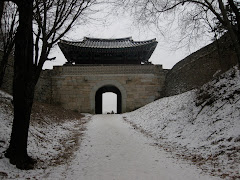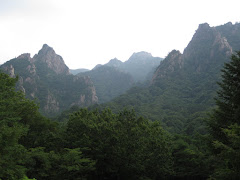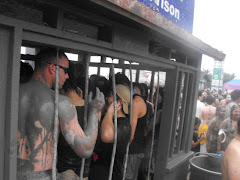Thursday, March 25, 2010
The good news; I have booked my return airfare and should soon have tickets in hand. It's a nice feeling to have a departure date (May 3), and I'm excited to count down the days. The bad news; there is much to do prior to leaving.
Sadly, I did not make it to Busan this past weekend. No reuniting with friends and no celebrations. The official reason; I woke up too late Friday morning and there was too much to do prior to leaving. That and I was not feeling 100% in the days prior to the weekend. Instead of another fine Busan adventure, I enjoyed a relaxing weekend of sleep and movie watching.
In Korea and much of East Asia, there is something called Hwangsa, or Yellow Dust. Apparently, it originates in the Gobi Desert of Mongolia, Kazakhstan, and Northern China. The seasonal winds carry this very fine dust in the Spring and Summer months toward Korea and it's people. Furthermore, it picks up many industrial pollutants along the Eastern coastline of China, thus making it a nasty mixture that wreaks havoc on the country.
I experienced this last week, when I awoke one morning with a sore throat. At first I thought I was getting sick, then I learned about this meteorological phenomena. The Koreans often complain about this, and I was told the dreadful surgical mask is strongly encouraged on high Hwangsa days.
I have read that last Saturday was among the worst Hwangsa days, and literally, the dust filled sky was an amber color. It was an eerie sight. The day following, a very fine yellow/brown dust was recognizable on nearly every surface, window pane, and automobile. It's disgusting.
The Average Seoul Resident:
According to a recent article published in The Korea Times, the average Seoul resident is 37 years old and works an average of 46 hours per week. Monthly salary is 3.6 million Won and they spend around 2.8 million Won per month. This, obviously, is the so-called middle class, which accounts for 6 out of 10 households.
The cost of private education, which has grown at around 20 percent annually, is around 580,000 Won per month for tutoring and after school hagwons for their children. I have read other reports that suggest this figure can sometimes be well above 2 million Won per month. Either way, the figure remains a staggeringly high number, and is one of the highest of any developed nation.
Every day in Seoul there are an average of 106 deaths, 197 marriages, 264 births, and 249 people obtain a driver's license. The birthrate is actually a decrease of around 3,700 from the previous year, which continues to be a perplexing social problem.
Single family households has increased 66 percent since 1999 as the marriage rate fell to its lowest level ever in 2009. In turn, the average age of first-time grooms and brides continues to rise and is currently 31 years old for men and 29 years old for women.
Economic News:
Recently, a U.S. economist projected the cost of a North/South Korean unification at $1.7 trillion. This is only slightly higher than last year's Credit Suisse projection of $1.5 trillion. Both figures are nearly double the South Korean GDP of around $930 billion. Obviously, it is suggested that any unification would benefit the North more than the South, and South Korea would, of course, bear the brunt of this expense.
McDonald's recently announced their ambitious plans to quadruple the number of restaurants in Korea., There are currently 237 stores, which makes it the second-largest burger chain following Lotteria, Korea's own fast-food hamburger chain with 800 stores nationwide. According to their press release, McDonald's says Korea is the wealthiest market where they don't have at least 1,000 stores.
Following the conclusion of the 2010 Winter Olympics, estimates suggest that Korea will earn nearly $18 billion (20 trillion Won) in economic effects and intangible value from their strong performance during the games. Wow! The intangible value includes a heightened sense of pride, stronger Korean culture and artistic self-confidence. In addition, many believe this will help increase Korea's opportunity to host the 2018 Winter Olympics in Pyeongchang.
The economic value of Yuna Kim's gold medal in women's figure skating alone is valued at over 5 trillion Won, and she will serve as an ambassador to the Pyeongcheong host committee.
Korean baseball is back, as the season officially opened last week. I have yet to make it to a game, though it's on my short list for next month. Strangely, as popular as baseball is in Korea, it is not a profitable business. Six of eight teams reported losses in 2008, and it is estimated each team annually loses between 15-20 billion Won (almost $20 million) on baseball operations. In fact, since the league started in 1982, it's been more of a publicity gig for the corporate-owned and named teams.
Thats about it, really. The clock continues to tick...

























































































































































No comments:
Post a Comment